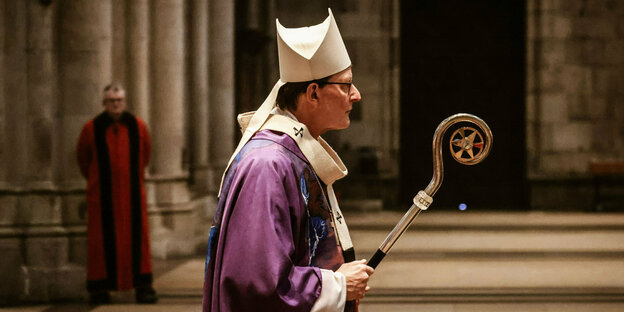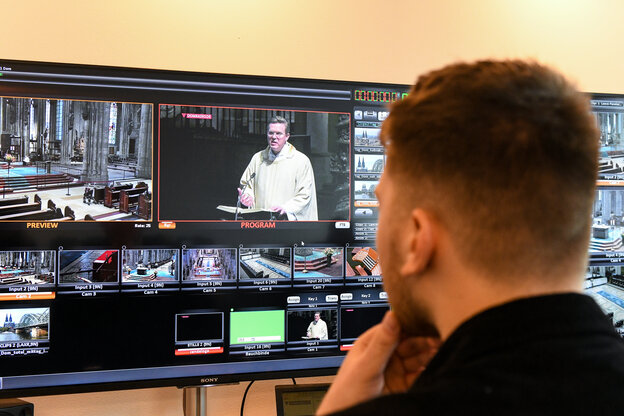The infamous Cologne Cardinal Woelki wants more influence on “Domradio”. Instead of critical content, the station could become more ecclesiastical.

Rainer Maria Woelki, Cardinal of Cologne, at a mass in the cathedral Photo: Oliver Berg/dpa
“A good connection to the top,” promises the Catholic multimedia station Domradio. Taking into account the latest plans of the Archdiocese of Cologne, in the future this line will lead rather to the Archbishop of Cologne, Rainer Maria Woelki, than to God. Domradio is a major player in the Christian media landscape.
Since it began airing in 2001, it has sought to balance theological reflections on the Marian month of May, for example, and contributions that take a critical look at the Church and the world. “Promoting diversity in the Church,” for example, is the title of an article on the cathedral radio.
This freedom of choice of topics was always guaranteed by a special structure that the station created when the former archbishop of Cologne, Joaquín Cardenal Meisner, founded the station: the cathedral radio. Although it receives subsidies from the Archdiocese of Cologne (the “Economic Plan 2024” provides for around 3.8 million euros), the sponsor is the educational organization of the Archdiocese, i.e. a formally independent association.
Cathedral radio is therefore not an official part of the public relations work of the Archdiocese of Cologne and can therefore go beyond the often narrow limits of church public relations.
Immediate access to multimedia channels
In March, journalist Joachim Frank made an announcement Cologne city advertisementiger publicly that the cathedral radio should be transferred to a non-profit joint stock company. In this way, the Archdiocese of Cologne would have direct access to the multimedia station and could configure it according to its ideas. A change that would be exemplary of the turmoil in church journalism and the increasingly tense relationship between churches and the free press.

Perhaps soon not only on the montage screen, but also in front of it: Cardinal Woelki in a “Domradio” broadcast, 2021 Photo: Harald Oppitz/KNA
How exactly this will happen is still unclear. In a brief press release in March, the Archdiocese of Cologne called the restructuring a “strengthening” of cathedral radio. It must continue to develop in view of “growing social polarization and the rapid development of the media sector.” The archdiocese later told the taz that the “journalistic profile” should be maintained and even expanded.
On the contrary, many social media users fear that cathedral radio will become a kind of advertising portal. And that after the intervention the station could dedicate more time to the so-called new evangelization. This is often understood as a spiritual renewal of the Catholic Church, the goal of which is to return people in secularized societies to faith.
These fears are not unfounded: until now, the station has repeatedly served as a platform for reformist forces who, like Benedictine Sister Philippa Rath, fight for equal rights in the Church. “The taboo has finally been broken,” Rath said on a cathedral radio program about women in church positions in 2022.
This places her in direct opposition to Archbishop Woelki of Cologne. In the past, she had repeatedly rejected applications from women to be ordained deacons or even priests. Furthermore, the archbishop repeatedly criticized disputes over power relations and structures that would harm the spiritual renewal of the Catholic Church. What would a cathedral radio be like according to Woelki's taste?
DJV criticizes the Cologne project
Journalistic experts, such as the North Rhine-Westphalia regional association of the German Association of Journalists (DJV), also criticized the Cologne project: Woelki's plans “do not favor the idea of professional and independent church journalism.”
The advisory board of the Domradio program warned of an additional consequence: the change of operator could lead to a new evaluation of the media law by the State Media Authority of North Rhine-Westphalia and thus to the loss of the transmission license. Other media affiliated with the church are already affected.
For example, the German Bishops' Conference (DBK) and the eight dioceses that support it decided in 2010 that the traditional weekly Rhenish Mercury It had to adapt to “changing media market conditions,” although it still reached more than 60,000 readers. Those responsible assured at the time that the decision did not imply a “withdrawal of the church from journalism or social discourse.”
The newspaper was not completely discontinued, but appeared thereafter under the same name; Christian and world as a weekly supplement TIME and became its full owner in 2016.
Given the growing distance between churches and the media, it is noted that some of their representatives also seek contacts with selected media outlets. This is how the Archbishop of Cologne Woelki celebrated the 75th birthday of daily mail A trade fair will take place in Neumünster, Würzburg in September 2023. The weekly is a “symbol of freedom,” the cardinal stated in his homily.
Voice of a silent majority
Since its founding it has dedicated itself to daily mail the “ministry of evangelization.” Like other right-wing actors, they stage daily mail Despite a comparatively small circulation of around 10,000 copies, it is often considered the voice of a supposedly silent majority within the Catholic Church.
Furthermore, the newspaper has become radicalized in recent years. Regular guest authors include representatives of the new right, such as the Belgian historian David Engels. He recently argued at the National Conservatism Conference in Brussels that “we should prefer our own civilization to others.”
Most radical voices also have a say in ecclesiastical issues. For example, the female diaconate is often criticized, although even the Vatican actively debates it. The Archdiocese of Cologne wanted to respond to a question from the Taz about Archbishop Woelki's proximity to daily mail don't comment.
The cathedral radio reflects this debate with its openness and is therefore not to the liking of the Cologne pastor. Perhaps that will change if he manages to exert greater influence over the multimedia broadcaster.
